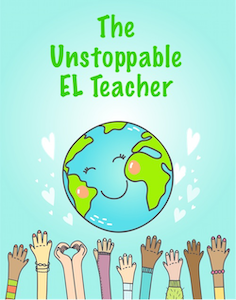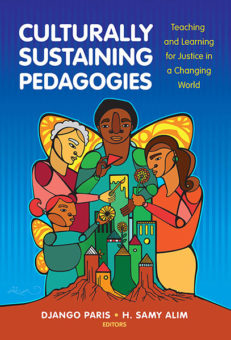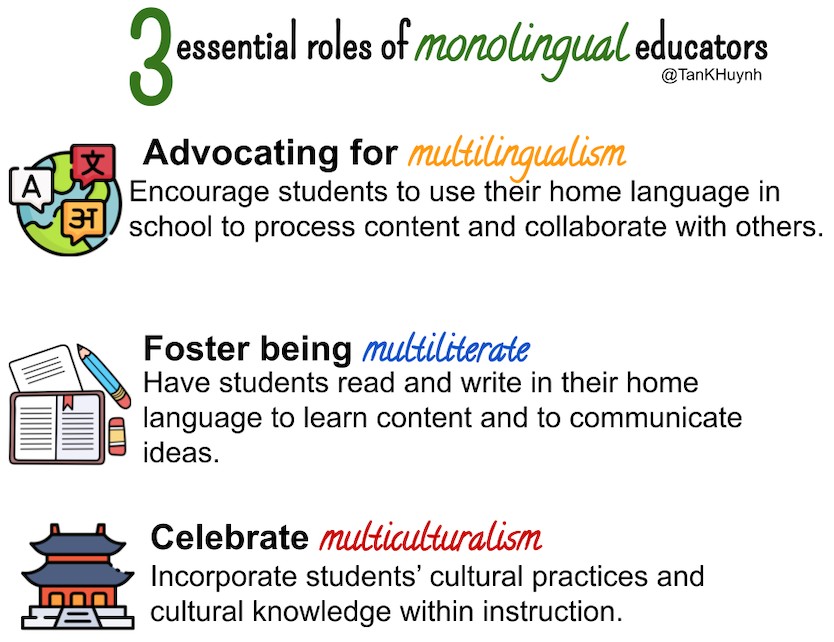3 Essential Roles for Monolingual Teachers
A MiddleWeb Blog

I also expressed how valuable the multilingual teachers were to the school as they can model and facilitate instruction in multiple languages.
I remember saying this one very controversial line: If I had a child enrolled in this school, I would hope they are placed in classrooms with a multilingual teacher.
Not all the teachers at that school were multilinguals. After the parent presentation, a teacher who was in attendance found me and said, “I feel really bad that I’m not a multilingual.”
I knew right at that moment that I had unintentionally undervalued the monolingual teachers. I was deeply embarrassed about how I may have made the monolingual teachers feel.
With reflection, I now realize that monolingual teachers do play a significant role in ensuring that their students become more multilingual, multiliterate, and multicultural. My conversation with Dr. Brandon Beck, a monolingual educator in a dual language program and author of Unlocking Unlimited Potential, revealed things monolinguals can do to support language learners.
Advocate for Multilingualism
Monolingual educators can encourage multilingualism at schools. They can be a champion for students and colleagues to freely translanguage. This means they can celebrate and encourage students to use their home language to:
• learn content
• process information
• complete assignments
• collaborate with others
• conference with others (e.g., friends, classmates, family members)
Monolingual educators also can resist proposed English-only policies or campaign to disband them. Having monolingual teachers advocating against English-privileging policies adds weight to the argument to end them.
Foster Being Multiliterate
We want students to also be multiliterate – in their home language and not just English. We want our multilingual students to read and write using their home language. Monolingual teachers can facilitate home-language literacy by encouraging students who are literate in their home language to:
- read in their home language to learn about a concept
- annotate, take notes, and sketchnote in the home language
- translate content-specific vocabulary words into the home language
- encourage guardians to read to their children in the home language
- watch a video in their home language to gain content-specific knowledge
- brainstorm, draft ideas, and organize in writing using the home language
Additionally, one of the best things monolingual educators can do is help students make cross-linguistic connections and develop the ability to see the similarity and differences between languages (James, 2012). One time, I was teaching students the concept of a singular possessive. While I was providing students with examples in English, I paused at the third example to ask students this essential question:
How do you say this in your language?
I shared how a possessive is communicated in Vietnamese, and students shared how it’s communicated in Chinese, Japanese, and Korean. I cannot speak those three languages, but I could still create opportunities for cross-linguistic connections. Monolingual teachers can also pause to have students share how something is said or structured in their home language and compare that to English.
Celebrate Multiculturalism
Monolingual educators can celebrate multiculturalism by intentionally incorporating students’ cultures and experiences within instruction. By doing this, teachers will sustain students’ cultural practices and knowledge that’s unique to their cultures (Paris et al., 2017).
Where and when it makes sense within the unit, monolinguals can use Dr. Rudine Sims Bishop’s mirrors, windows, sliding glass doors framework (1990) to foster multiculturalism:
- Windows: incorporating experiences from non-dominant cultures so students see other cultures exist and are valuable.
- Mirrors: reflecting the positive aspects of students’ cultures. When reflecting the limitations, do so with a gentle touch.
- Sliding glass doors: creating experiences where students can interact with people from different cultures or engage in practices from different cultures.
Teachers do not have to speak multiple languages to value different cultures. When we incorporate students’ cultures, we recognize the assets that they bring to schools. Students also feel valued and recognized, and they can more fully express themselves because their cultures are integrated within instruction.
Conclusion
I wish I could take back how I communicated being multilingual without ostracizing the monolingual educators. I hope that this article serves you in your campaign to lift the value and highlight the roles monolingual educators have in creating a multilingual, multiliterate, multicultural community for their students. Being a monolingual does not handicap us from advocating for multilingualism.
References
Bishop, R. S. (Summer, 1990). “Mirrors, Windows, and Sliding Glass Doors. Perspectives: Choosing and Using Books for the Classroom,” Perspectives 6(3). View now as PDF.
James, M.A. (2012). Cross-Linguistic Influence and Transfer of Learning. In: Seel N.M. (eds) Encyclopedia of the Sciences of Learning. Springer, Boston, MA.

Paris, D., Alim, H. S., Genishi, C., & Alvermann, D. E. (Eds.). (2017). Culturally sustaining pedagogies: teaching and learning for justice in a changing world. Teachers College Press.


































